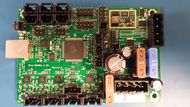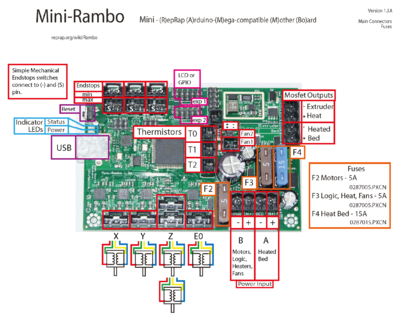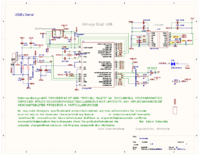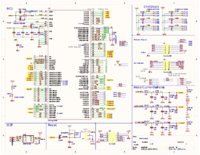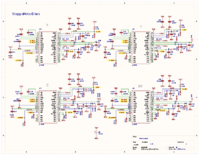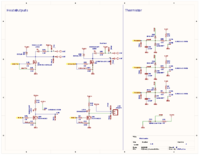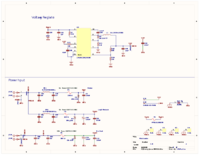MiniRambo
Release status: Working
| Description | Smaller version of RAMBo with 4 stepper drivers.
|
| License | Creative Commons Attribution-ShareAlike 3.0
|
| Author | |
| Contributors | |
| Based-on | |
| Categories | |
| CAD Models | |
| External Link |
RAMBo Pages: RAMBo .:. RAMBo v1.0-1.1 .:. RAMBo v1.2 .:. RAMBo Firmware .:. RAMBo Development .:. MiniRambo .:. MiniRambo Development
Contents
Summary
This board is based off RAMBo, the Arduino MEGA design, and the work of RepRap community. It has 4 stepper drivers and 4 mosfet switched outputs.
Versions
- 1.3a (current version)
- 2x5 RepRapDiscount compatible LCD connectors
- 1.0-1.1b
- These earlier versions use finer pitch GPIO ports that were left off the board during manufacturing. Consequently it would be difficult to add an LCD panel to these boards.
Differences from Rambo
MiniRambo has:
- 4 stepper drivers vs. 5
- 3 Thermistor jacks vs. 4
- 4 total mosfets vs. 6
- PWM control of stepper current vs. Digital Trimpot
- Can connect RepRapDiscount LCD cables directly without an adapter board. (version 1.3a only)
- Less general purpose IO connectors than Rambo.
Powering Mini-Rambo
MiniRambo you must connect power to the Primary Power input for RAMBo to operate. The USB connection is isolated from the rest of the board and cannot be a power source.
Features
Logic
- Arduino MEGA compatible Atmega2560 and Atmega32u2 processors are compatible with all RAMPS class firmware
- Crystals for both usb and mcu (timing accurate to 10ppm)
- 3 Thermistor jacks
Motor Drivers
- 4 A4982 1/16th microstep motor drivers(2 connectors on Z for Prusa Mendel and other dual Z printer designs)
- PWM Outputs for (XY), Z, E0 stepper current control instead of digital trimpot.
- Current limit on driver IC VCC to prevent permanent latchup
- Microstep mode configured by MCU through firmware (no jumpers needed)
- Test points for driver control signals
- Step and Direction pins are on their own ports for synchronous movement capability
PWM DC outputs (Extruders, Fans, Etc.)
- 4 outputs (1 Extruder, 1 BED, 2 low power (fan,etc)
- Low resistance mosfets for cool running
- Indicator led for each channel
Power
- 2 power input rails
- Heated Bed, 15A 12-35V
- Primary Power 10A 12-28V: Motors (5A dedicated fuse) + Extruders, Fans, & Logic (5A dedicated fuse)
- Built in SMPS for 5V generation from Extruders + fans and logic
PCB
- 4 layer
- 2oz copper on all layers
- High quality, High temperature FR4-TG130 PCB
- Gold ENIG finishing
Schematic
Fuses
MiniRambo has 3 user replaceable ATO fuses (the type found in many automotives).
- F1 5A supplies the motors.
- F2 5A supplies the extruder heater + fan outputs and logic.
- F3 15A supplies the heated bed output.
Firmware
Marlin 1.0.2
fork with Thermal Runaway Protection during heatup phase
https://github.com/tonokip/Marlin/tree/1.0.2-TRP
This firmware requires a change in Configuration.h:
#define MOTHERBOARD 302
Marlin development branch
https://github.com/MarlinFirmware/Marlin/tree/Development
This firmware requires a change in Configuration.h:
#define MOTHERBOARD BOARD_MINIRAMBO
REPRAP_DISCOUNT_FULL_GRAPHIC_SMART_CONTROLLER
Using this LCD controller requires a fix in Marlin source code. In the file "ultralcd_st7920_u8glib_rrd.h" change this line:
#pragma GCC optimize (3)
To:
#pragma GCC optimize (0)
USB Driver
Mini-Rambo uses the same Windows CDC driver as the RAMBo USB driver.
Troubleshooting
This is a generic troubleshooting guide. These steps may vary depending on manufacturer configuration. Contact your supplier if these steps do not help.
- Cannot connect with 3D printing control software
- Is the power indicator LED on?
- Make sure the power is connected as described in :Powering Mini-Rambo.
- Is a fuse blown? MiniRambo fuses
- Is correct driver installed? RAMBo USB driver
- Is there firmware installed on your Mini-Rambo? Mini-Rambo firmware
- Is the power indicator LED on?
